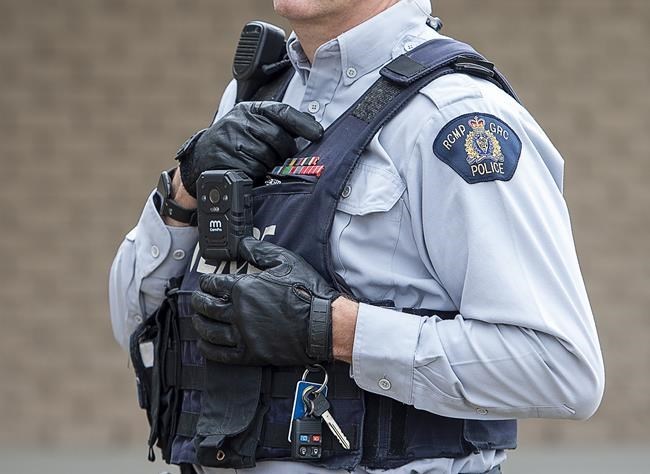EDMONTON — The Alberta government is planning to require all police services in the province to use body cameras.
Public Safety Minister Mike Ellis said Tuesday that officers often respond to complex calls and make split-second decisions.
That can raise concerns from the public about officers' actions and whether appropriate force was used.
"Mandating police to wear body-worn cameras is a transformational decision that will ensure all interactions with officers are objective," Ellis said.
"Police are responding to complex calls that may involve vulnerable Albertans (who) are experiencing mental health crises, suffering from addiction or having difficult moments in their (lives) that (are) clouding their decision-making skills."
Ellis said the provincial government will be working with the Alberta Association of Chiefs of Police on funding, logistics and when the cameras will roll out. He said the association is to develop a mandate over the next few months to "swiftly get body cameras onto the streets as soon as possible."
He said Alberta would be the first province to mandate body cameras.
"Police will know that taking appropriate action and using the right amount of force is required in every incident, and police officers who use excessive force will face proper discipline thanks to body camera footage," Ellis said.
The Alberta Association of Chiefs of Police said it supports the move and police in Calgary have already implemented the devices.
"Never before has there been such scrutiny on policing — and rightly so. We are provided with powers of detention and are held to a very high standard," said Camrose police Chief Dean LaGrange, the association's vice-president.
"The cameras are a good source of protection, not only for the public, but for the police officers wearing them."
Edmonton police Chief Dale McFee said details of the cost and how the cameras will get to all police services is to be done in short order.
The cameras will help ensure the public gets the entire story, he said.
"If you don't have this transparency, what happens is you get snapshots of video, whether it's off a cellphone, whether it's off of different cameras, that only portray a picture of it," McFee said. "That takes the toll on everybody, because sometimes the devil in relation to the details is a lot more than a snapshot in time."
Irfan Sabir, the Alberta NDP justice critic, said he supports increased transparency, but there aren't many details in the plan.
"There are no timelines, no funding and a lack of clarity regarding how the vast amount of data generated by body-worn cameras will be managed," Sabir said.
He added that the province's police watchdog, the Alberta Serious Incident Response Team, has a "massive backlog of cases."
“If the (United Conservative Party government) was serious about transparency, they would be focused on clearing this backlog so law enforcement is held accountable and Albertans have access to justice."
Dunia Nur, president of the African Canadian Civic Engagement Council, said she will be watching closely "to ensure that the implementation of police body cameras includes anti-racist policies and practices, and that gaps identified in other jurisdictions have been addressed to create a more just and equitable society."
Ellis said the mandate does not cover the RCMP, but the federal government has indicated it will be moving toward more body cameras in the future.
This report by The Canadian Press was first published March 14, 2023.
The Canadian Press
Note to readers: This is a corrected story; An earlier version included the incorrect pronoun for Dunia Nur.



